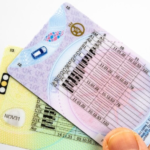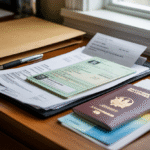Driving License Revoked: What It Means, Why It Happens, and How to Recover It
Driving license revoked—these three words can dramatically impact your daily life. In the UK, having your driving licence revoked means your legal right to drive has been withdrawn by the Driver and Vehicle Licensing Agency (DVLA). This is different from a suspension, which is typically temporary and often based on a set time frame. A revocation, however, usually requires action on your part to reapply for a licence—and often to prove you’re fit to drive again.
Whether due to medical reasons, serious driving offences, or failure to comply with DVLA regulations, a revoked licence is a serious matter. This article explains the main reasons why your driving licence might be revoked, what happens after, and how you can work toward getting it back.
Common Reasons for a Driving License Revocation
Understanding why your driving license might be revoked is the first step toward addressing the issue. Here are the most common reasons:
- Medical Conditions
Medical conditions are among the leading causes for licence revocation in the UK. The DVLA has a long list of conditions that must be reported, such as:
Epilepsy
Stroke or TIA (mini-stroke)
Parkinson’s disease
Diabetes (especially with hypoglycaemic episodes)
Heart conditions
Mental health disorders that affect concentration or decision-makingIf your GP or consultant believes you are no longer medically fit to drive, they are obligated to inform the DVLA. The DVLA will then assess the situation and may revoke your licence for safety reasons.
- Failure to Provide Medical Evidence
If you are asked to submit medical reports or attend medical assessments by the DVLA and fail to do so, your licence can be revoked automatically, even if you’re medically fit. Compliance is crucial.
- Accumulation of Penalty Points
If you accumulate 12 or more penalty points on your driving record within three years, you could face a ban or revocation. For new drivers, the rules are stricter: if you gain 6 points or more within two years of passing your test, your licence will be revoked, and you’ll need to retake both the theory and practical tests.Driving license revoked
- Serious Driving Offences
Offences such as dangerous driving, drink-driving, drug-driving, or causing death by careless or dangerous driving can result in immediate revocation by court order. Courts will inform the DVLA, which then revokes the licence.
What Happens When Your Driving License Is Revoked?
If your driving license is revoked, you will receive an official letter from the DVLA explaining:
The reason for the revocation
The date the revocation comes into effect
Whether and when you can reapplyFrom the revocation date onward, it is illegal to drive. You must not attempt to drive until your licence is reinstated. Driving without a valid licence is a criminal offence and can result in further penalties, including heavy fines and imprisonment.
How to Reapply After a Revoked Licence
Your path to regaining your licence depends on the reason for the revocation.Driving license revoked
Reapplying After a Medical Revocation
Wait for the DVLA to confirm you are eligible to reapply.Driving license revoked
Get medical clearance from your doctor or specialist.Driving license revoked
Fill out a D1 application form and the appropriate medical forms (available from the DVLA or post office).
Submit the forms with any required documentation.Driving license revoked
Wait for the DVLA to assess your application. They may contact your healthcare providers or ask for an independent medical assessment.Driving license revokedReapplying After a New Driver Revocation
If you’re a new driver (within 2 years of passing your first full test) and your licence is revoked:
You must retake the theory and practical driving tests.
Once passed, reapply for a full licence.Reapplying After a Court Revocation
After serving any disqualification period set by the court:
Check if you need to take a medical examination (especially for drink/drug-related offences).Driving license revoked
Apply to have your licence reinstated through the DVLA.
You may also need to retake your driving test in certain cases.Appealing a Revoked Licence
If you believe your driving license has been wrongly revoked, you may have the right to appeal. For medical revocations, you can:
Request a reassessment or second medical opinion.
Provide new medical evidence supporting your fitness to drive.For court-ordered revocations, you’ll need to appeal through the Magistrates’ Court within six months of the decision. Legal assistance is highly recommended in such cases.
How to Avoid Revocation
While some causes are out of your control, such as sudden illness, you can take steps to reduce the risk of having your driving licence revoked:
Report medical conditions honestly and promptly to the DVLA.
Attend all required medical evaluations and renewals on time.
Drive responsibly and obey traffic laws to avoid accumulating penalty points.
Keep your licence details up to date, including address and contact info.Final Thoughts
Hearing that your driving license is revoked can be daunting, but it’s not necessarily the end of your driving journey. Understanding the reason behind the revocation and following the correct procedure to reapply can help you get back on the road legally. Whether it’s a medical issue, a driving offence, or a simple paperwork error, taking informed and timely action is crucial.
Always consult with your GP, solicitor, or the DVLA for guidance tailored to your situation. With the right steps, regaining your licence is possible—and often quicker than you think.Driving license revoked





